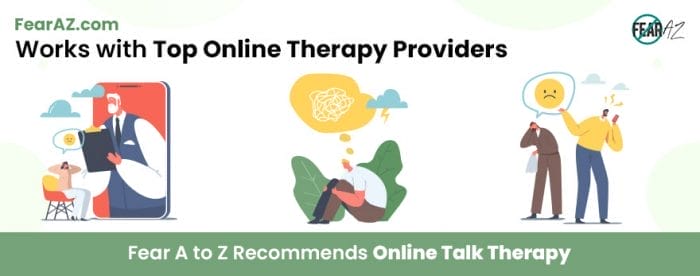Share This Article
Don’t Envy Those with a Fear of Jealousy
Have you ever felt sick to your stomach when your partner is interested in someone else? Does the mere thought of feeling jealous throw you into a state of panic? Do you avoid forming close relationships to avoid jealousy?
If you answered yes, you may have zelophobia or the fear of jealousy.
Now, why is the fear of jealousy called zelophobia? Well, the word is derived from the Greek word for jealousy — zelo.
It is natural to feel jealous from time to time, but when this feeling becomes overwhelming and begins to impact your relationships, it can turn into a crippling phobia. Zelophobia can cause intense anxiety and emotional discomfort, making daily life challenging.
If you’re suffering from this condition, it’s important to know that help is available. And with some time, patience, and the right treatment, you can conquer your phobia of jealousy.

What Is Zelophobia?
Among all the different kinds of phobias, zelophobia may not sound serious or even real. But it is a valid phobia that can have significant consequences on one’s quality of life.
Fear can be irrational and all-consuming, just like jealousy. So, if you ever find yourself feeling anxious or distressed at the thought of someone else getting too close to your loved ones, consider the possibility of zelophobia.
Zelophobia can cause you to feel like you’re not good enough and that you’ll never measure up to others. You may constantly question your significant other’s relationships with other people and begin to feel paranoid.
If left untreated, zelophobia can harm your self-worth and self-esteem.
Thankfully, there are ways to overcome it.
Zelophobia Causes
It’s common and normal to feel jealous when your partner talks to someone of the opposite sex, or when your best friend hangs out with someone else. However, when this feeling becomes irrational and persistent, it may escalate and turn into a phobia.
Some people develop zelophobia due to past experiences, such as being cheated on or betrayed by someone they loved. Traumatic experiences like this can create a deep-rooted fear of jealousy that can be difficult to shake off.
Others may have had a controlling or possessive partner or parent who made them feel that their jealousy was justified. In some cases, zelophobia can also be a learned behavior where individuals have seen someone close to them struggling with this feeling.
Symptoms of Zelophobia
The symptoms of zelophobia can vary from one person to another. Some individuals may experience only a few symptoms, while others may react more severely.
Here are some of the most common symptoms of zelophobia:
Physical Symptoms
- Rapid heartbeat
- Sweating
- Trembling or shaking
- Feeling dizzy or lightheaded
- Shortness of breath
- Nausea or upset stomach
Psychological Symptoms
- Intense anxiety
- Fear of abandonment
- Feeling insecure or inadequate
- Anger or resentment toward others
- Thoughts of hurting oneself or others
- Avoiding social situations
- Fear of losing control
- Fear of feeling helpless
A person suffering from zelophobia may experience some of these symptoms simultaneously or, in extreme cases, may even experience all of them.
Zelophobia Treatment
Self-Help Options
Zelophobia, or the fear of jealousy, can be tough to handle. And while seeking professional treatment is the most effective way to deal with this phobia, there are also several self-help methods that can help you deal with this fear.
First and foremost, practice self-compassion. Remember, it’s okay to feel jealous sometimes. You’re human, not a robot. Treat yourself like you would treat your close friend — with kindness and support.
Don’t let the green-eyed monster control your thoughts. When you start thinking negative thoughts, reframe them into something more positive. Instead of thinking “I’ll never be as good as them,” try thinking “I’m doing my best and that’s pretty awesome.”
And if that doesn’t work, practice mindfulness. When jealousy hits, take some deep breaths and focus on how your body feels. Take a break, do some yoga, or just sit in silence for a few minutes.
Zelophobia may feel difficult to overcome. But with the right self-help approaches, the fear may be managed and minimized.
Professional Help
Those who struggle with zelophobia have several options for seeking professional help. There are two types of therapy in particular that are known to be effective when dealing with phobias: cognitive-behavioral therapy (CBT) and exposure therapy.
Cognitive-Behavioral Therapy (CBT)
CBT is a widely used technique for treating phobias, including zelophobia. A trained therapist will help identify your fears and triggers. They will also teach you to perceive the phobia for what it truly is — an irrational fear. By addressing the root cause of your irrational jealousy, CBT can help you manage your triggers more effectively.
Exposure Therapy
Exposure therapy involves progressively exposing you to situations and experiences that trigger your phobia in a controlled environment. The goal is to gradually desensitize you to the things that make you jealous and anxious, enabling you to control your fear more successfully. Under the guidance of a trained therapist, exposure therapy can be an effective method for overcoming zelophobia.
Whether you choose CBT or exposure therapy, taking a proactive approach to your zelophobia can help you manage your fear and lead a happier, more fulfilling life.
How to Cope with Zelophobia
When you have to deal with a phobia throughout your life, it’s important to find ways to manage the fear.
Identify your triggers. Think about the things that make you feel like you’re at the bottom of the jealousy pile. Is it social media or finding out about someone else’s achievements? Once you know what triggers your jealousy, you can either avoid those triggers or find a way to deal with them.
But more importantly, focus on being thankful. Practice gratitude. Find something positive in your life each day, no matter how small.
Conclusion
Don’t let your fear of jealousy hold you back from experiencing all that life has to offer. Seek help from a professional if necessary, and remember that you are not alone in your struggle.
By acknowledging and addressing your fears, you can learn to manage and eventually completely overcome this irrational phobia.




